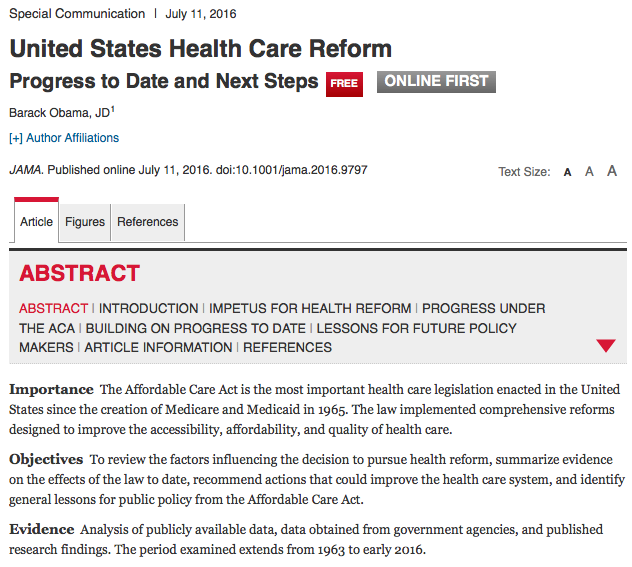What’s JAMA’s new impact factor now that POTUS has published a paper there? As you probably heard, Mr. Obama published a paper in the Journal of the American Medical Association this week, describing the progress to date of the US Health Care Reform and outlining the next steps.
I have so many questions: was the review process (if there was one) double blind? Was he first rejected from NEJM? Was there a revise and resubmit? Was Obama totally nice to that rude referee #2, so that his paper could get published without further hassle? If you’re a handling editor or a referee, we want to hear from you (anonymously or not)…
That is, hilariously, Berk Ozler. Someone should do a Freedom of Information Act request for the referee reports and response. I would read those.
Who do you even pick as a referee? Mitch McConnell?
I can just see the editor’s revise and resubmit letter to the President: “…You should respond to R1 and R2’s concerns, but I will not be returning the manuscript to R3, who responded merely that the Affordable Care Act was a “huuuuuge mistake” and that R3’s unspecified plan would be “so great and way better”.
There is a curious lack of coauthors. This proves it: Obama is gunning for a tenured position at U Chicago or Columbia.
Update: It turns out someone DID interview the JAMA editor about the process!
If you’re interested, here’s the abstract:
Importance The Affordable Care Act is the most important health care legislation enacted in the United States since the creation of Medicare and Medicaid in 1965. The law implemented comprehensive reforms designed to improve the accessibility, affordability, and quality of health care.
Objectives To review the factors influencing the decision to pursue health reform, summarize evidence on the effects of the law to date, recommend actions that could improve the health care system, and identify general lessons for public policy from the Affordable Care Act.
Evidence Analysis of publicly available data, data obtained from government agencies, and published research findings. The period examined extends from 1963 to early 2016.
Findings The Affordable Care Act has made significant progress toward solving long-standing challenges facing the US health care system related to access, affordability, and quality of care. Since the Affordable Care Act became law, the uninsured rate has declined by 43%, from 16.0% in 2010 to 9.1% in 2015, primarily because of the law’s reforms. Research has documented accompanying improvements in access to care (for example, an estimated reduction in the share of nonelderly adults unable to afford care of 5.5 percentage points), financial security (for example, an estimated reduction in debts sent to collection of $600-$1000 per person gaining Medicaid coverage), and health (for example, an estimated reduction in the share of nonelderly adults reporting fair or poor health of 3.4 percentage points). The law has also begun the process of transforming health care payment systems, with an estimated 30% of traditional Medicare payments now flowing through alternative payment models like bundled payments or accountable care organizations. These and related reforms have contributed to a sustained period of slow growth in per-enrollee health care spending and improvements in health care quality. Despite this progress, major opportunities to improve the health care system remain.
Conclusions and Relevance Policy makers should build on progress made by the Affordable Care Act by continuing to implement the Health Insurance Marketplaces and delivery system reform, increasing federal financial assistance for Marketplace enrollees, introducing a public plan option in areas lacking individual market competition, and taking actions to reduce prescription drug costs. Although partisanship and special interest opposition remain, experience with the Affordable Care Act demonstrates that positive change is achievable on some of the nation’s most complex challenges.


12 Responses
Evidence Analysis of publicly available data, data obtained from government agencies, and published research findings. The period examined extends from 1963 to early 2016.
golu dolls
golu dolls
Obama just published a peer reviewed article on US health care reform: https://t.co/SRXtrbtxmg
RT @cblatts: Obama just published this JAMA article, and I so want to see his referee reports https://t.co/4HHsJKota1
RT @cblatts: Obama just published this JAMA article, and I so want to see his referee reports https://t.co/4HHsJKota1
Obama just published this JAMA article, and I so want to see his referee reports https://t.co/azPSNsZS4y
…disappointed author doesn’t have a google scholar account
RT @cblatts: Obama just published this JAMA article, and I so want to see his referee reports https://t.co/4HHsJKota1
RT @cblatts: Obama just published this JAMA article, and I so want to see his referee reports https://t.co/4HHsJKota1
RT @cblatts: Obama just published this JAMA article, and I so want to see his referee reports https://t.co/4HHsJKota1
@neuroecology @cblatts 2nd! do you think they went outside the USA for reviewers?
@cblatts Unfortunately, the journal said the article wasn’t peer reviewed. Maybe when Obama has some extra time. https://t.co/l1hs9rGvXy
Obama just published this JAMA article, and I so want to see his referee reports https://t.co/LouBNAFbGI